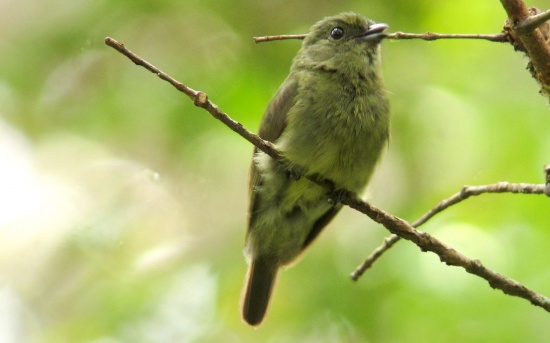JohnN-1520 (talk | contribs) |
Sbarnhardt (talk | contribs) (Add Gsearch checked template) |
||
| (8 intermediate revisions by 6 users not shown) | |||
| Line 1: | Line 1: | ||
| − | {{ | + | [[Image:Black Manakin - Xenopipo atronitens 1 - Mit Amazonia.JPG|thumb|550px|right|Photo by {{user|COLOMBIA+Birding|COLOMBIA Birding}}<br>Mitu, [[Colombia]], February 2014]] |
| − | ;Xenopipo atronitens | + | ;[[: Category:Xenopipo|Xenopipo]] atronitens |
| − | + | ==Identification== | |
| + | 12–13 cm: Long tail, heavy bill | ||
| + | ==Distribution== | ||
| + | [[Colombia]], [[Venezuela]], The [[Guianas]], and [[Brazil]], to [[Bolivia]]<sup>[[#References|1]]</sup>, <sup>[[#References|2]]</sup>. | ||
| + | ==Taxonomy== | ||
| + | This is a [[Dictionary_M-S#M|monotypic]] species<sup>[[#References|[1]]]</sup>. | ||
| + | ==Habitat== | ||
| + | Moist lowland forests and dry shrubland. | ||
| + | ==Behaviour== | ||
| + | ====Breeding==== | ||
| + | They build a small flimsy nest from leaves bound with spiders' webs. | ||
| + | ====Diet==== | ||
| + | The diet includes small fruit, berries and insects. | ||
| + | ==References== | ||
| + | #{{Ref-Clements6thAug14}}# Restall et al. 2006. Birds of Northern South America. Yale University Press. ISBN 9780300124156 | ||
| + | #Handbook of the Birds of the World Alive (retrieved August 2014) | ||
| + | #Wikipedia | ||
| + | {{ref}} | ||
==External Links== | ==External Links== | ||
| − | {{GSearch|Xenopipo+atronitens}} | + | {{GSearch|Xenopipo+atronitens}} |
| − | [[Category:Birds]] [[Category: | + | {{GS-checked}} |
| + | [[Category:Birds]][[Category:Xenopipo]] | ||
Latest revision as of 18:54, 7 February 2022
- Xenopipo atronitens
Identification
12–13 cm: Long tail, heavy bill
Distribution
Colombia, Venezuela, The Guianas, and Brazil, to Bolivia1, 2.
Taxonomy
This is a monotypic species[1].
Habitat
Moist lowland forests and dry shrubland.
Behaviour
Breeding
They build a small flimsy nest from leaves bound with spiders' webs.
Diet
The diet includes small fruit, berries and insects.
References
- Clements, J. F., T. S. Schulenberg, M. J. Iliff, D. Roberson, T. A. Fredericks, B. L. Sullivan, and C. L. Wood. 2014. The eBird/Clements checklist of birds of the world: Version 6.9., with updates to August 2014. Downloaded from http://www.birds.cornell.edu/clementschecklist/download/
- Restall et al. 2006. Birds of Northern South America. Yale University Press. ISBN 9780300124156
- Handbook of the Birds of the World Alive (retrieved August 2014)
- Wikipedia
Recommended Citation
- BirdForum Opus contributors. (2024) Black Manakin. In: BirdForum, the forum for wild birds and birding. Retrieved 15 May 2024 from https://www.birdforum.net/opus/Black_Manakin
External Links
GSearch checked for 2020 platform.




